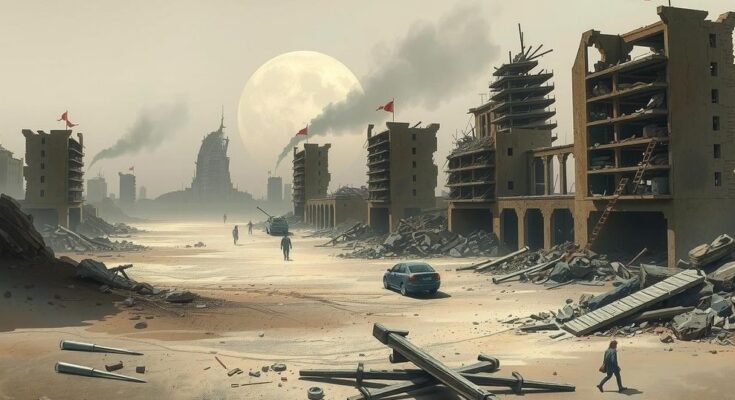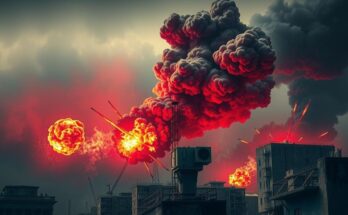The civil conflict in Sudan has reached a humanitarian catastrophe as around 30 million people need urgent support. Following the dissolution of a civilian-military partnership in 2021, violence escalated with the RSF seizing territories. The ensuing humanitarian crisis has led to numerous fatalities and massive population displacements while foreign countries may have exacerbated the situation. Current military confrontations illustrate the complexities of establishing peace and democracy in the country.
The civil conflict in Sudan is entering its second year, reflecting a dire humanitarian situation in the country. Approximately 30 million of the 50 million residents require immediate humanitarian aid, while 9 million have been displaced internally and around 3 million have sought refuge in neighboring nations. The United Nations Secretary-General has described the situation as one of “staggering scale and brutality.”
Sudan previously experienced a glimmer of hope for democracy following the ousting of long-time ruler Omar al-Bashir through popular protests in 2018-2019. A transitional civilian-military Sovereignty Council was established to steer the nation towards democracy. However, in October 2021, the military unilaterally dissolved this partnership, with General Abdel Fattah al-Burhan leading the council and Lt General Mohamed Hamdan Dagalo, known as Hemedti, assuming the deputy role, leveraging the infamous Rapid Support Forces (RSF).
The RSF evolved from the notorious Janjaweed militia known for its historic violence in Darfur, with its numbers swelling from 5,000 fighters in 2014 to approximately 100,000 by early 2023. Attempts to restore the democratic process faltered, ultimately resulting in military rule from January 2022, led by the dual generals. The conflict intensified when the RSF launched a coordinated attack on April 15, 2023, prompting widespread violence across Sudan.
By the end of 2023, the RSF had captured significant territories, including most of Darfur and considerable parts of Khartoum. By June 2024, the toll from the conflict was staggering, with estimates of 150,000 casualties and 12 million individuals displaced. The RSF was regularly accused of intensifying food shortages and inflicting deliberate famine. The parallel atrocities committed during the conflict have caught the attention of global leaders.
As the fighting continued, the RSF experienced initial military successes but faced setbacks due to strategic miscalculations and supply issues. The Sudan Armed Forces (SAF) bolstered its capabilities through improved recruitment and training, regaining parts of Khartoum by February 2025. However, civilian suffering escalated, with rising casualties due to the brutality of both warring factions.
International involvement has complicated Sudan’s conflict. Notably, the UAE has played a pivotal role, providing military supplies to the RSF while mutually seeking an end to the influence of the Muslim Brotherhood in Sudan. Recent arms supplies and financial connections between the UAE and Dagalo have solidified this foreign intervention.
In an effort to counter the RSF’s strength, the SAF has developed an alliance with Iran and Russia for military support. Iran’s provision of advanced drones has reportedly aided SAF operations. Furthermore, promises of Russian backing and a potential naval base on the Red Sea could significantly shift power dynamics in the region.
Despite the ongoing catastrophe in Sudan, U.S. engagement has diminished considerably following the establishment of military rule. Sanctions levied against Dagalo and the RSF in early 2023 aimed to address systemic atrocities. Nevertheless, the prospect for a transition to democratic governance appears bleak once more.
Even though the SAF might control Khartoum entirely, the RSF retains substantial control over several provinces, indicating a de facto partitioning of Sudan. Both factions have shown little inclination to participate in a genuine transition to civilian-led governance, revealing a cycle of violence that could perpetuate instability and suffering for the Sudanese population.
The ongoing civil conflict in Sudan presents a complex humanitarian crisis compounded by foreign interventions and internal power struggles. Despite previous efforts toward democracy, the situation has deteriorated, resulting in mass displacement and significant loss of life. As both the SAF and RSF vie for control, any prospects for stability seem fragmented at best. International players continue to influence the conflict, complicating the route to a peaceful resolution. The urgent need for humanitarian aid persists, highlighting the profound impact on the Sudanese population caught in this turmoil.
Original Source: frontline.thehindu.com




